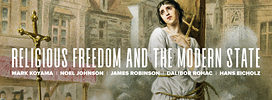Johnson and Koyama make a bold argument about the connection between state formation and religious freedom. In my previous response I argued that I didn’t understand why states that had freed themselves with pacts from the Church had any interest in actually promoting religious freedom. But more importantly, I wondered how this argument applied elsewhere in the world. Their response was that China, for example, developed a different historical relationship between state and society, with a secular state dominant and no religious or other type of liberty.
OK, but let me now question the association between religious liberty and liberty more generally. Is it true that there is a necessary connection between religious liberty and liberty more broadly? Europe developed both; China developed neither. What about the “off diagonals”? Johnson and Koyama’s account might seem to imply that these are empty, but I don’t think that is right. Could you have a situation where there is religious liberty, but not liberty? I think the answer is yes, and the obvious case for me is pre-colonial Africa.
There was little general liberty in historical Africa. Robert Rattray, the first head of the first Anthropological Department of Asante, and part of the British colony of the Gold Coast, now Ghana, transcribed an Asante proverb in 1929,
When a chicken separates itself from the rest, a hawk will get it.
As Rattray put it,
[A] condition of voluntary servitude was, in a very literal sense, the heritage of every Ashanti; it formed indeed the essential basis of his social system. In West Africa it was the masterless man and woman who ran the imminent danger of having what we should term ‘their freedom’ turned into involuntary bondage of a much more drastic nature.
By involuntary bondage of a “much more drastic nature,” Rattray of course meant slavery. The Hobbesian nature of West African society in the era of the slave trade and its aftermath meant that to be safe, you had to surrender your freedom and become a client, tied to someone more powerful. Another proverb he wrote down said “If you have not a master, a beast will catch you.”
People were not free, but they were free to practice whatever religion they wanted. In fact Africans seem to have had a very pragmatic attitude toward religion. There were no Bibles and texts defining what was orthodoxy or heterodoxy and religious ideas and practices seem to have mostly been viewed on the basis of whether they worked or not. One of the myths of the LoDagaa people on Northern Ghana, transcribed by the anthropologist Jack Goody, belonged to the Bagre initiation society. It recognizes that the practices of the society were not “God’s way” but then continues
In God’s country What is there to surpass this?
If it worked, it was worshipped. Notions of one god (for example Onyame among the Akan Rattray studied) intersected with ancestral cults, secret societies, and rain shrines. The Kuba kingdom of the Congo rainforest had three different creator spirits, Mboom, who they likely brought with them on their migration, Ngaan, adopted from the local Kete peopleb and Ncyeem apoong, probably brought by King Shyaam, in the 17th century when he founded the state. After that, the Kete were not forced to worship Mboom.
This the African experience shows that there is no necessary relationship between religious toleration or liberty and liberty more broadly construed.

